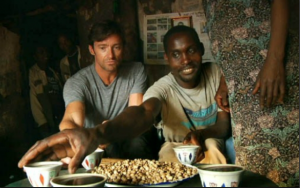Hugh Jackman movie Dukale’s Dream has star boosting fair trade coffee in Ethiopia
 By Richard Crouse – Metro Canada
By Richard Crouse – Metro Canada
The new Hugh Jackman movie could have been called Wolverine Goes to Ethiopia.
Instead, the documentary of Jackman’s trip to the African country to raise awareness about the benefits of fair trade coffee and ethical consumption is called Dukale’s Dream and debuted on iTunes yesterday.
The story began six years ago when Jackman and his wife Deborra-Lee Furness teamed with World Vision as ambassadors. On their first trip to Ethiopia they met a coffee farmer named Dukale, a man who would inspire them personally and professionally.
“When we met Dukale there was definitely a sense that he and Hugh had a great and immediate connection,” says the film’s director Josh Rothstein.
“There is just something about his personality and Hugh’s personality. By default they both lead with smiles and warmth. There is something amazing about watching these two people from such different cultures just having this immediate connection. They both got a kick out of each other.”
The connection made with this Ethiopian farmer deepened Jackman’s commitment to using his fame to raise awareness for fair trade coffee. “He’s well aware he has that profile and that’s part of what we document,” says Rothstein, “his sense of a responsibility. Of saying, ‘I have this profile, what do I want to do with it?’”
Dukale’s Dream is part of the mission but, as the film shows us, Jackman also put his money where his mouth is with the establishment of Laughing Man, a coffee company that only sells fair trade coffee and tea — products farmed using ecologically friendly methods and sold for the benefit of the farmer and consumer, including coffee that comes directly from Dukale’s farm.
All Jackman’s profits are donated to the Laughing Man Foundation, which supports educational programs, community development and entrepreneurs around the world.
Laughing Man demonstrates how consumers can be directly linked to the coffee chain to create jobs and better lives for people the world over, but Rothstein hopes the film opens eyes as well.
“I’d love to be able to look back and say the film really helped to move the needle in the space of making coffee a one hundred per cent sustainable commodity,” he says.
“It has such a profound impact on global poverty and the environment. (We) can impact various industries with (our) purchase choices. That is the larger agenda. I think it is possible and I think there is something contagious about the idea that in our everyday lives we have power.”
